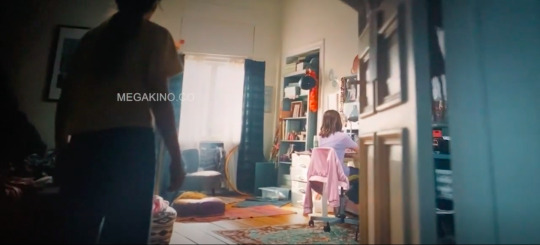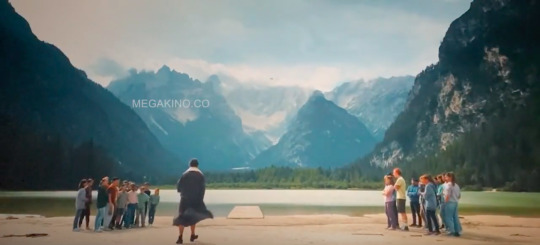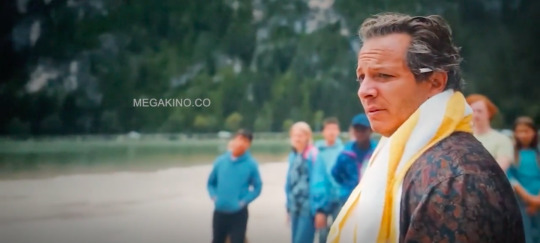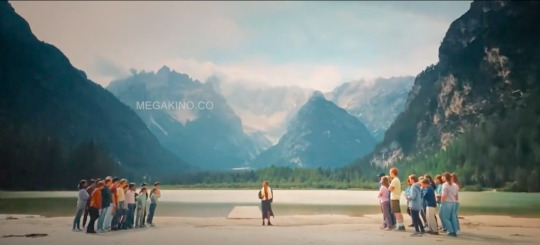#and once again i have to mourn that english doesn’t have a formal and informal You
Text
PART 13
of the dfk audiobook translation
@cnka
Matze: „You know, maybe you need to do something that nobody else dares to do.“
Uli: „What do you mean?“
Matze: „Something unexpected I guess. …I don’t know, think of something!“

Narrator (audiobook):
It leaves us hoping this advice won’t end up disastrous.
Martina hurries to the house of the Kreuzkamms. Herr Kreuzkamm is playing with his little son in front of the entrance, who is sitting in the drivers seat of a small VW Bus while Herr Kreuzkamm secures a surf board on the roof.

Little son: „Vroom! Vrrroooom!“
Herr Kreuzkamm: „Huh? Do you want to honk?“
Martina, out of breath: „Hello? Herr Kreuzkamm?“
Herr Kreuzkamm: „Hello. Yes?“
Martina: „Is Ruda home?“
Herr Kreuzkamm: „Well, that’s a lot going on today. First the whole gang tramples through our house. Then someone wanted the keys to the rowing club. Then someone wanted a climbing rope. And now you?“
Martina: „Is Ruda still here?“
Herr Kreuzkamm: „Yeah, she’s up in her room. You can go in, the door‘s open.“
Martina: „Thank you.“
Narrator (audiobook):
Martina hurries up the stairs, enters the house and opens Ruda's door.

Narrator (audiobook):
She’s sitting at her desk and turns around emphatically bored.

Ruda: (sighs) „What do you want.“
Martina: „You have to release Jo.“
Ruda: „Oh, really?“
Martina: „Yes.“
Ruda: „You used our skating rink. Egerland saw you. And that’s why we took your best friend!“
Martina: „What?! You guys are crazy!“
Ruda: „This is our proposal. We want the wagon.“
Martina: „Can’t we just make peace for once? Is that so hard?!“

Ruda: „Internals and Externs don’t mix. Have never mixed. You’ll learn it.“
Martina: „Yeah? Then we’ll free her by force.“
Ruda: „By force? How cute. I can’t wait so see that. Doctor's daughter.“
Martina: „I’m-”
Ruda: „You don’t even know where Jo is.“

SCENE CHANGE
Narrator (audiobook):
Sebi, Musti and another Extern have tied Jo to a chair in a boat house by the lake.

Sebi: „So, we need to go now. You’re provided for. Watch over her.“
Jo: „No, you can’t just leave me alone like this!! Let me go!“
Narrator (audiobook):
Sebi and Musti leave the boat house while the third one stays with Jo and keeps staring at her incessantly.


Jo: „What are you staring at?!“
SCENE CHANGE
The Nichtraucher theme plays while he walks through grass with a towel over his shoulder.
Narrator (Nichtraucher):
When I get stuck with my story, I smoke. Or I go for a swim or play piano.

Narrator (Nichtraucher):
Um. You should swim or play piano, forget about the smoking thing! I’ve wanted to quit for a long time!
In any case, I went outside and knew how the story continued.
The Internals and Externs have gathered at the lake shore in seperate groups.
Internal: „Dude, what do we do now?“
Martina runs up to them.
Martina, out of breath: „There’s no other way! Didn’t find a solution. They want the wagon now.“
Matze: „Never! Jo wouldn’t have let that happen.“
Ruda runs up to the other Externs and greets Musti.
Matze: „We need to fight this out.“
Narrator (audiobook):
The Externs have also arrived now, and like in a group duel the two parties stand face to face at the lake shore.
Suddenly, Robert appears, who wants to take a bath.

Nichtraucher, in a completely nonchalant tone: „What’s going on here?“
Martina: „They kidnapped Jo!“
Matze: „This will be a battle.“

Nichtraucher: „You want to fight? …Meinetwegen. But don’t think I’ll stitch up your injured. I hope your all vaccinated against Tetanus.“

Martina: „Are you a doctor?“

Nichtraucher: (annoyed sigh) „Tell me, can’t you just let two representatives fight this thing out? Each group sends one… and who falls off the bridge first… loses. Hm?“

#das fliegende klassenzimmer#dfk 2023 audiobook translation#das fliegende klassenzimmer 2023#dfk#mine#hes such an icon 😭#im obsessed with him#and once again i have to mourn that english doesn’t have a formal and informal You#it feels so significant that martina uses the informal You here#just like jo did when they filmed. and when they first met it was the formal You
9 notes
·
View notes
Text
things left behind and the things that are ahead, ch. 23
AO3 link here

It starts with England for their thirtieth anniversary. He surprises her with the tickets three weeks in advance, mid-August, so that she has enough time to arrange to be away. She’s been back since the end of the war, but mostly on business and they’ve never been together. Now Peggy takes him to what was once her house, sketching with hands and words the way things had been, the way that they still are in her memories, although the reality has changed so much. He had done the same as they went past now-demolished tenements and renovated schoolhouses back in Brooklyn. They walk arm in arm down London streets they once strode down in uniform, side by careful side, and marvel at how different it all has become.
After that, they chose somewhere new every year: Spain, Japan, Brazil, Morocco. They try to find native guides in each destination, someone to show off the hidden treasures that tourists don’t usually know about or take the time to see. Steve puts together albums to show the kids when they come home. As he flips through the pages, he notices that they have automatic positions that they assume for pictures together, wherever they are in the world.

They have been in Russia for a week before they go to Volgograd, and even then Steve delays. They go to a few museums, take a city walking tour, visit the Eltonsky Natural Park and its surprisingly lovely salt lake, and Peggy is wondering how much longer he is going to put it off when he asks her if she would like to do some shopping after lunch.
“Certainly,” she says, finishing off the last of the medovik she had ordered for dessert. “And it seems the perfect time for it: to be honest, I’m not sure that even I could tour another war monument.”
They pick up some general souvenirs for the kids - pretty little pottery dishes, elaborately painted Matryoshka dolls, lovely and delicate Orenburg shawls - at the various shops along the street. They are each carrying a weighty bag by the time they reach the music store.
“Good afternoon,” a woman’s voice calls in Russian from deep in the crowded shop, and a moment later she steps out to rest her hands on the counter. Her face is young but a bit careworn, a few silvery strands already sneaking into her hair, although it is hard to tell whether it is from age or simply the propensity for redheads to begin getting white hairs early.
“Can I help you?” she asks, looking between Peggy and Steve.
Peggy steps forward. “Good afternoon. We are visiting from America, and were doing some shopping in your neighborhood.” Her Russian is, as she would say with just a bit of satisfaction, quite serviceable. The woman smiles.
“We do not see many tourists here, so I am happy you were able to visit. Are you shopping for something special?”
Before Peggy can answer, there is the light, sharp sound of heels tapping downstairs and a small girl, red hair pinned back from her face, enters behind her mother.
“Mamochka, are you certain I don’t have my dancing class today?” she asks winningly, barely glancing at the strangers in the shop.
“Yes, Natashenka,” says the woman, with that mix of fondness and real weariness that Steve knows well. “I am certain that you don’t have your dancing class today, because it is Wednesday and you dance on Monday.”
“Ah.” The girl purses her lips, standing on her tiptoes and taking a few steps back and forth, running a finger along the counter.
“But Wednesday,” continues her mother, “is the perfect day to practice the violin, hmm?”
With a charming smile: “Are you sure? Maybe Thursday would be better.”
“Wednesday and also Thursday would be just fine for me,” and Steve stifles a laugh at the pout on Natasha’s face before she sighs and moves back among the rows of instruments and sheet music.
“I apologize,” says the woman, turning back to Steve and Peggy. “What were you looking for?”
“Our daughter plays the piano,” Peggy lies. “And we wondered if you might have some traditional sheet music for us to bring back. Folk songs, perhaps.”
“I’d like to explore the shop, if you don’t mind,” Steve says, knowing that his Russian is more formal and less fluid or practiced than Peggy’s. It doesn’t seem to matter; he is waved back as the two women fall into conversation.
The shop is narrow but fairly deep. There are thick carpets on the floors, handheld instruments along one wall - strings hanging or propped on stands, woodwinds in little carved nooks, a few brass items and an accordian interspersed between - and drawers along the other, presumably for sheet music. He follows the tentative plucking of violin strings back until he finds a little rehearsal space with music stands and a small upright piano. Little Natasha stands in the center with her shoes off, toes curling in the carpet as she rests the instrument on her shoulder.
“Hello,” he says, his voice pitched not loudly enough to disturb, but not softly enough for a secret either.
“Hello,” she returns, eagerly letting her bow rest against the floor as she turns to him, ready to be distracted.
“Would you play something for me?” he asks. “It can be anything you like.”
“I don’t know how to play songs I like yet,” she says, drooping a little. He smiles. He remembers a preference for - simultaneously - classical music and female fronted punk, but he doesn’t think that’s what this girl has in mind.
“Then maybe just something you’ve been practicing? I’d like to hear you.”
She takes a deep breath in and plays a simple but lively piece. Even he can hear the mistakes, but it’s pretty and more than he could ever attempt. The melody continues rising, not quite hitting a crescendo before she pulls the bow away and says, “That’s all I remember.”
He puts down his bag to clap politely. “That was very good,” he says. “I’m sure your mother is very proud.”
She makes a face. “She says that I could be better, that she started practicing when she was even younger than me. But she also says that Papa was born with a violin in his hand, and I don’t think that can be true.”
“I suppose you come from a very musical family,” Steve says, trying to blank his face although he suspects that a smile is still playing around his mouth.
“Mama says that music comes to us like water comes to the Volga.” She sets the violin on the piano bench and perches up on her tiptoes again. “But I have a secret.” She tilts her head in question, wondering if he is trustworthy, and he crouches automatically, tilting his head in receptive return.
She leans in a little before she whispers, “I want to be a dancer, not a musician.” She does a little pirouette, girlish and clumsy and eager, her arms out and toes barely avoiding being tangled in the carpet pile. She faces him again with an enormous smile, a little mischievous in a way that is familiar, free in a way that is not.
Steve thinks of the restraint in Natasha as he knew her, the deliberation taken with every action, even with her joy. He swallows against the pain in his throat.
“I think that you will be a very excellent dancer,” he says. “But music is good for learning too. My children did not learn about music from me, and needed to learn on their own.”
“How many children do you have?”
“Four.” He takes a photo out of his wallet and shows her. “My daughters,” he says, pointing. “And my son. And my grandsons. And two husbands and one wife.”
She looks at the smiling strangers in the picture then back up at him. “Why do you talk like that? Your words are so strange.”
“I’m American. I usually speak English. I haven’t spoken Russian in a long time.”
Natasha considers this, then declares magnanimously, “For a Russian, you do not speak very good Russian, but for an American you are excellent.”
“Thank you.” Steve laughs, and stands to his feet once more. “A friend taught me.”
He had not asked her to do it, but in those years of partnering on missions for SHIELD and then later, after Tony had stepped away and Clint had left and Bruce was locked in his lab, when it was just the shattered two of them helping to keep some sort of order...He never questioned when or why she started her little lessons, just took them in. He had trusted Natasha, had admired and fought beside her, had mourned her, mourns her still in some ways, but there was so much he had hoped to understand about her and never can.
The little girl who will never be Natasha Romanoff slips her hand into his. “She must have been a very good friend. I would not have so much patience.”
“She was,” Steve says, gently squeezing her small fingers, “a very good friend.”

The information he had to find her had been so limited. Red hair. Russia. “Natasha, daughter of Ivan,” Clint had reported to them, and despite its source, Steve trusted that more than he did whatever information had been fed to Zola. He assumed that Natalia Alianovna Romanoff was a Red Room created background, but even that couldn’t be certain.
“Less common names would have been quite helpful,” Peggy had said each time she watched Steve pore over SHIELD-provided records of births in Russia. Later, once they had narrowed things down and moved on to the photographs snapped by agents in the area on other assignments, she reminded him carefully that they did not know whether she had been born somewhere rural or at home, without complete records, with a different name, if her parents had perhaps never been in a position to meet at all. But Peggy also never stopped him or told him to give up or refused to transmit his requests. She would have done the same for a missing agent, an untraceable friend.
(There were so many factors and it was still quicksilver confusion, even after all this time, especially after all this time - the changes and their ripples. Twenty-five years ago, he had the SHIELD clipping bureau on a standing assignment for local Iowa birth announcements, ten years ago for circus advertisements. Now he’s moved on to crime blotters, and in the surrounding states too, but he hasn’t found a trace of Clint or his brother. He doesn’t know if they’ve disappeared or if he just hasn’t come across them.)
And then the Volgograd file had been delivered.
She was a year younger than had been claimed, not quite three in the picture he saw and more daughter of Alyona now, considering Ivan had been killed in a car accident before she could walk. Living in an apartment above the family music store, living in a world where the Red Room would never come knocking, where she would grow up entirely different from the person he had known. He had recognized her immediately.
He had told Peggy for several years that he hadn’t needed to see her, that he knew that she was safe and that was enough.
And then she suggested Russia. And suddenly he did want to see.

They are slightly quieter than usual but only slightly as they return to their hotel to deposit their bags, as they find a restaurant for dinner and chat over their meal (lamb-filled dumplings called beriki for Peggy, a delicious but less adventurous beef stroganoff for Steve), take a short walk and return to their hotel to get ready for bed.
Steve can’t sleep. He lies on his back and stares up at the ceiling until he finally whispers, “Peg? Are you awake?”
Though she’s turned over on her side and burrowed beneath the blankets, she answers immediately and with surprising lucidity. “Well, I was wondering how long you would take.”
“What do you mean?”
She eases over onto her other side to look at him even in the darkness. “You were going to ask me once again if I think that you’ve endangered the world further by shifting the circumstances that resulted in your friends becoming heroes. And I would remind you that people can have perfectly average and non-traumatic childhoods and still find courage within themselves when called for it, and also point out that fortunately, shifting the circumstances has created less of a need for a band of enhanced crime-fighters and will hopefully continue to do so. And then you were to have some sweet and honorable realization about human nature being good at the core and not needing the crucible of damage for that to come out, and you would tell me that I’m correct and kiss me and then finally be able to fall asleep.”
He laughs. “We’ve done this before, huh?”
“Several times,” she says dryly, but not without fondness.
“It’s hard for me to really take it in,” he says, turning toward her too. His voice is serious again. “I keep wondering if I’ve taken away these amazing people who could have been, who could have protected the world if we had made a mess of things.”
“Or,” she points out, equally serious now, “you’ve simply allowed them to be amazing in different ways, and to suffer less as they work toward it.”
He thinks of Bruce, in school even now, still brilliant, with a mother and stepfather he apparently goes to visit over breaks. Steve had glimpsed him once while visiting Drea in Boston. They had passed each other at the Public Gardens entirely by coincidence, Bruce grinning at a friend as they went down into the subway station in a way that Steve almost didn’t recognize, not noticing the man staring at him. He thinks of Sam, still a kid now. Military recruiters don’t come to high schools anymore. He remembers Natasha today, loved and loving, unbounded.
“It’s harder than I thought it would be,” he says. “Thinking of them out in the world, but that I’m the only one who will ever know the versions of them that I did. It’s hard to carry the reality of it alone, even if I think they’re better for it.”
“It’s always been hard, the things we carry, but worthwhile, I think. And necessary.”
He kisses her. “You’re probably right,” he says, stroking a thumb along her temple and brushing the hair back gently from her face.
“Hmm.” She turns back over, settling against him. After a moment she says, “Perhaps someplace warm and relaxing for next year?”
“We’ve tried that. You always say that you want to relax but then end up solving a local murder or getting rid of a corrupt police chief,” Steve points out.
“Well, precisely,” she says, and he laughs and puts an arm around her and allows himself to try for sleep.
More chapters here
22 notes
·
View notes
Note
Tell me ALL about Jane Boleyn, I have to be at work in the morning and I want to procrastinate going to sleep Educate Me Please
Listen Jane Boleyn was a goddamn queen who did NOT deserve to be dragged like she was.
-Jane Boleyn was considered extremely beautiful by 16th century English standards. We can pretty safely say this because she was picked repeatedly to show off in front of foreign ambassadors. The most notable being that she was chosen to take to France for the infamous Field of the Cloth of Gold AND not long after she was again picked to fill the role of Constancy in Chateau Vert. We also know that Anne picked her again to join her in a masque to impress Francis and the French nobles
-Apart from being pretty the above examples also suggest she was rather accomplished in dancing.
-Jane Parker was a distant cousin of Henry’s, and her father Henry Parker the Elder had been under the care of Margaret Beaufort who took an interest in him, promoting his interests, safe guarding his inheritance after his widowed mother remarried to a Howard, and promoted his match with Alice St. John-Jane’s mother.
-Jane had several brothers and sisters, but as far as we can tell, only two made it to adulthood-her sister Margaret who married John Shelton and whose decedent once incurred Elizabeth’s wrath when she married without seeking her consent first and her brother Henry Parker the younger whose own son refused to swear to the Act of Supremacy and was promptly sent into exile for it. While Jane kept her religious views to herself, we know Henry was an avid supporter of the Reformation. Her father on the other hand was a Catholic.
-Jane had been in the service of Katherine of Aragon for some years before marrying George. We don’t know exactly WHEN Jane arrived at court, but probably before 1523. Cavendish, in his poem, mentions she had been brought up at court since a young age-though girls were not allowed to serve as Maids till they were thirteen.
-Jane was most likely 19/20 when she married George. It is believed she was of an age with him, her birth date usually stated as being 1505, a year after George’s usually stated birth date.
-Both George AND Jane were listed as being particular favorites of Katherine of Aragon and Henry VIII by Wolsey.
-We don’t know exactly when but it seems Jane left Katherine of Aragon’s service sometime after Anne was formally recognized and joined her sister-in-law’s service. One could argue this was simply because she was considered Anne’s family, but given that several members of Anne’s family were left out of Anne’s service or stubbornly stuck by Katherine (chief being Norfolk’s wife) it’s equally plausible Jane was legitimately loyal to Anne.
-While Anne was at her height in power, Jane was given a great deal of respect and dignity and featured as one of Anne’s foremost ladies, alongside Anne’s cousin Mary Howard, and Anne’s sister Mary Boleyn. Again Anne seems to have favored and preferred her family members, and Jane-as George’s wife-would have been viewed as much her family as Mary was.
-Jane was a patroness who financially supported at least one religious man, and sought out positions for him to fill.
-During Anne’s coronation march Jane was given a spot of the highest honor, allowed to ride directly behind Anne, with the kingdom’s most powerful and noted women, far above what her station as Viscountess afforded her. This was no small gesture, and it was likely very deliberate on Anne’s part. By placing her sister in law with the ranks of such women as the Duchess of Richmond, she was stating that Jane was now a woman of influence and should be treated with the highest regard.
-According to Chapuys, Jane was banished once while attempting to help Anne get rid of a young woman who had caught Henry’s eye and had shown sympathies to Mary. Chapuys doesn’t report what Jane did specifically, only stating that it had been done in collaboration with Anne. Jane rarely pops up in Chapuys’ dispatches but when they do, it should be noted that he painted her as being in league with the Boleyns, not against them.
-Jane wrote to George while he was in France. We don’t know what she said, for her letters don’t survive, but they are referenced by Anne’s chamberlain, who refrained from telling George in his own letter about a situation with Suffolk because he was sure Jane had already told him in hers.
-Apparently it was to Jane, not George, that Anne uttered her infamous statement about her husband suffering from erectile dysfunction (and not being able to please her) While many historians have erroneously stated it was to George who she said this to, that’s a falsehood probably coming about because it was at George’s trial that the statement was used-suggesting that Jane had probably confided in her husband what Anne had said.
-Also despite what some historians say it was not said that Jane told Cromwell that George laughed at the way the King dressed. The statement that George had done so cropped up immediately after the statement about what Anne had told Jane in Chapuy’s report on George’s trial, leading for many people to scrunch the two statements together.
-There isn’t much evidence that Jane Boleyn was the sole informant against her husband and sister in law. Most everyone who was actually present at the trials mention many other women by name as being responsible, but Jane is never one of the names given. Jane’s name never even cropped up on the list of suspects till decades after her death.
-Three days after George’s arrest, Jane was allowed to get a short message to her husband in the tower-an impressive feat since communication was strictly forbidden between the arrested and their families. She wasn’t allowed to give the message herself but it was delivered to George by two political enemies of the Boleyns’. Ives and other historians have stated that the messengers were proof that Jane had had malicious intentions in her message, but more likely the choice of messengers was made by Henry and Cromwell, and that Jane had absolutely no say in the matter. The exact wording of the message is lost to us but we know from Kingston that it more or less asked after his well being and promised to petition Henry on his behalf. George is recorded as having asked the messengers to send her his thanks. While briefly he appeared comforted by the message we know a short while later he broke down into tears. People don’t give the fact that Jane not only managed to but even ATTEMPTED AT ALL to reach out to her husband enough credit. Jane didn’t leave George to his fate like the rest of his family seemed to do, she was the only one who came closest to doing what we often have Mary doing in alot of popular Tudor fiction: trying to help her family.
-According to one historian, Jane made a pubic sign of sympathy for her husband.
-After George’s execution Jane fell on financially hard times, made even worse because Thomas Boleyn refused to pay the proper amount due to her via her jointure. Infuriated she wrote to Thomas Cromwell complaining and asking him to help her get Thomas Boleyn to cough it up, and asking if Cromwell would return to her George’s plate as it would be a great comfort to her.
-She fucking wrested her marriage bed back from Henry. Jane Boleyn was a badass in her own way.
-Jane wore widow reeds for the rest of her life, and notably after 1536 only ever wore black (as opposed to before 1536 when she had a very colorful wardrobe). As has been pointed out before this doesn’t necessarily mean she was wearing it in mourning, but it should be noted Cavendish called her a widow “woe-begone in black”
-She was listed as being a chief mourner for Jane Seymour at her funeral.
-Princess Mary paid for repairs to Jane’s windows once, and on occasion gave her ladies’ money.
-Jane is one of the ladies recorded as having the infamous conversation with Anne of Cleves regarding her sex life (or lack of) with Henry. It was Jane Boleyn who was recorded as declaring “I do believe her majesty is a maid still!”
-According to Katherine Howard, once Jane tried to leave her and Culpepper alone and Katherine had to call her back and reprimand her for neglecting her duties.
-It was reportedly either Jane Boleyn who called Culpepper a sweet little fool, or Culpepper who called Katherine Howard that.
-Jane stated in the interrogations that she fell asleep during Culpepper and Katherine’s meeting, but this is likely a lie
-According to Katherine Howard, Jane was recorded as coaching her on how to handle the interrogators, and promised her she’d never reveal what had happened “to be torn with wild horses”
-Jane most likely suffered from a nervous breakdown after her arrest, which Chapuys and other referred to as her “going mad”. She was taken from the tower and given to the constable and his wife to nurse. Henry even sent his own doctors to take care of her. Jane went through periods of “lucidity” at this time which is when they were able to interrogate her.
-According to Chapuys’ upon hearing that she was to die Jane regained her “sanity” (most likely her composure)
-Jane died after her mistress Katherine Howard, as the highest ranking was always executed first. Jane apparently made a speech, though there are conflicting tales about it’s length. Chapuys’ states she and Katherine both were to nervous to say much, but the French ambassador stated that it was Katherine who was relatively quiet while Jane made a lengthy speech. Otwell Johnson, in a letter to his brother, states that both women died with such dignity and bravery that he had no doubt both women were in heaven.
-Jane’s body was found in Victorian times and given a proper burial and a marker which can be seen today on the chapel floor.
-Jane’s name is also listed on the monument on the tower green alongside Katherine, Anne and Margaret Pole. It’s touching that despite her nasty legend and reputation she has still been given proper respect and attention in monuments.
-Far from being what we often see in media and in some non fiction depictions, Jane was not a vile bitter harpy desperate for revenge or hell bent on mischief. The Jane of records was a Jane who was loyal, charming, affable, and well liked, who wasn’t afraid to assert and fight for what she thought was hers by right, and who could not just survive but thrive in the courts of five very different women. Who succeeded despite the odds being stacked against her. The Jane of the records feels very much like a real human woman, not a cartoon villain.
387 notes
·
View notes